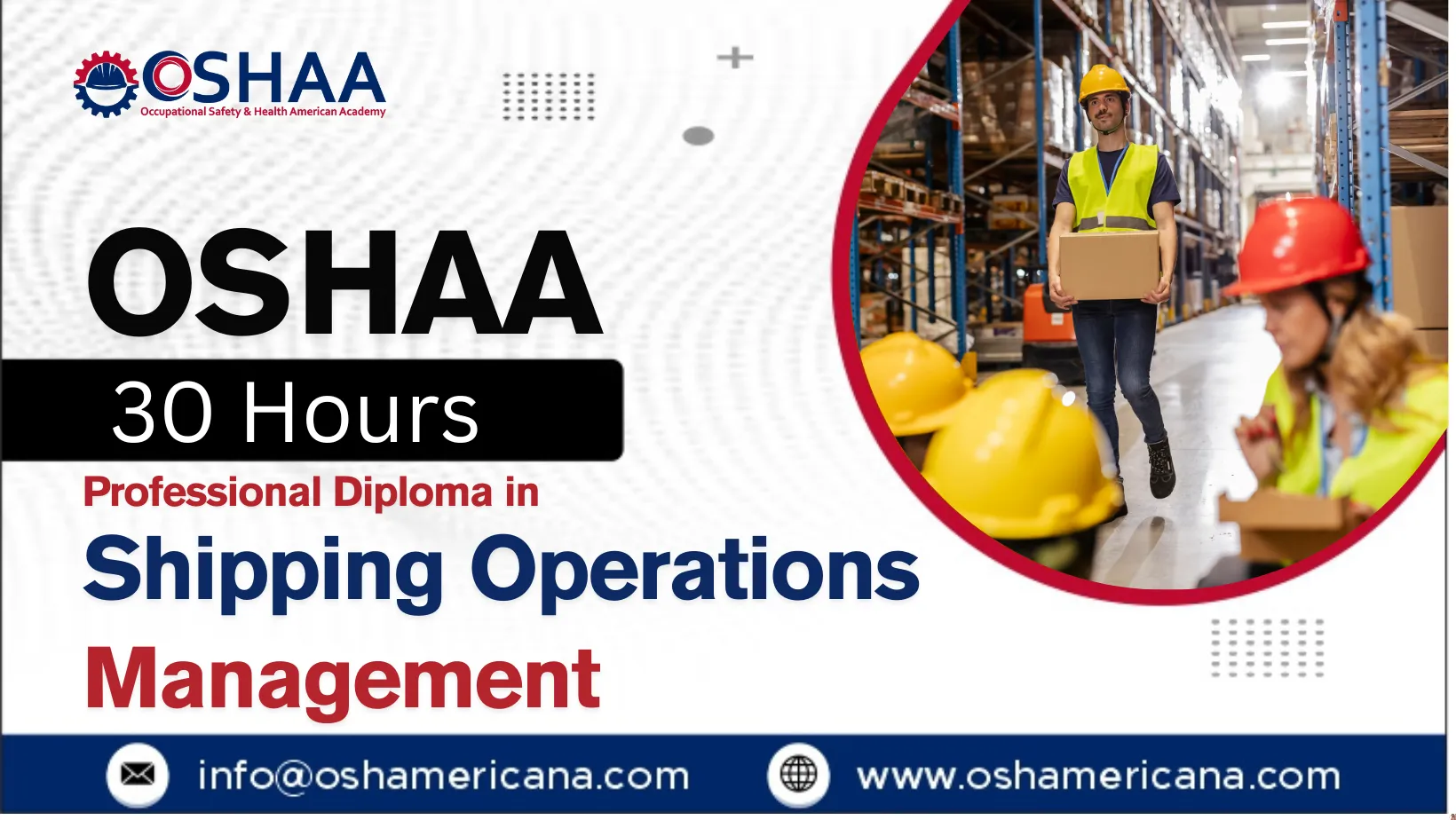The OSHAA 30 Hour Professional Diploma in Shipping Operations and Management is a globally respected qualification designed for learners who want to advance their careers in the shipping, logistics, and maritime management sectors. This program combines the internationally recognized OSHA 30 Hour safety certification with specialized training in shipping operations, giving learners a unique advantage in today’s competitive global marketplace.
Through this diploma, learners gain in‑depth knowledge of maritime safety standards, cargo handling, port operations, supply chain logistics, and international shipping regulations. The curriculum is carefully structured to provide both theoretical understanding and practical insights, ensuring that learners are prepared to meet the complex demands of modern shipping operations.
Graduates of this program are well positioned for roles such as shipping operations manager, port supervisor, logistics coordinator, and maritime safety officer. With the shipping and logistics industry continuing to expand worldwide, professionals who hold OSHA 30 Hour certification alongside advanced management training are highly sought after by employers across international trade, logistics companies, and port authorities.
Completing this diploma not only enhances professional credibility but also equips learners with the skills to manage safety compliance, streamline operations, and lead teams effectively. The program supports career growth both locally and internationally, making it an ideal choice for learners who want to strengthen their expertise and open new opportunities in the global shipping industry.
The OSHAA 30 Hour Professional Diploma in Shipping Operations and Management is more than a certification—it is a career‑defining qualification that empowers learners to thrive in one of the world’s most dynamic and essential industries.
OSHAA 30 Hour Professional Diploma in Shipping Operations and Management
- Minimum Age Learners must be at least 18 years old to enroll in the program.
- Educational Background A high school diploma or equivalent qualification is required; higher education in business, logistics, or engineering is helpful but not mandatory.
- Professional Experience No prior work experience is required, though basic knowledge of shipping, logistics, or safety practices is an advantage.
- Language Proficiency Learners should have good English communication skills (recommended level: IELTS 5.5 / TOEFL iBT 65 / CEFR B2 or equivalent).
- Technical Requirements Access to a computer or smart device with reliable internet is necessary for online learning and assessments.
- Learning Commitment Learners should be prepared to complete around 30 guided learning hours plus additional self‑study.
- Digital Skills Basic ability to use online platforms, digital resources, and interactive assessments is required.
- Professional Attitude Learners must demonstrate motivation, commitment, and willingness to follow safety, compliance, and ethical standards.
Study Units
Learning Outcomes
Introduction to OSHAA 30 Hour Standards and Maritime Safety
- Demonstrate a clear understanding of OSHA 30 Hour safety principles and their application in maritime environments.
- Identify workplace hazards specific to shipping operations and apply OSHA guidelines to mitigate risks.
- Explain the importance of compliance with OSHA standards for international maritime safety.
- Apply safety protocols to reduce accidents, injuries, and operational downtime in shipping operations.
- Evaluate case studies of maritime incidents to understand the role of OSHA compliance in prevention.
- Develop awareness of personal protective equipment (PPE) requirements and safe work practices.
- Integrate OSHA 30 Hour training into daily shipping operations for improved safety culture.
- Recognize the global relevance of OSHA standards in enhancing professional credibility.
Principles of Shipping Operations and Port Management
- Explain the structure and functions of modern shipping operations and port facilities.
- Analyze the role of ports in global trade and supply chain networks.
- Apply operational strategies to improve efficiency in port and terminal management.
- Identify key stakeholders in shipping operations and their interdependent roles.
- Evaluate the impact of port infrastructure on shipping performance and logistics.
- Demonstrate knowledge of vessel scheduling, berthing, and cargo flow management.
- Assess challenges in port congestion and propose effective management solutions.
- Understand the integration of shipping operations with international logistics systems.
International Maritime Regulations and Compliance Frameworks
- Interpret international maritime conventions such as SOLAS, MARPOL, and ISM Code.
- Explain the role of the International Maritime Organization (IMO) in global shipping governance.
- Apply compliance frameworks to ensure safe and environmentally responsible operations.
- Evaluate the impact of international regulations on shipping companies and port authorities.
- Demonstrate knowledge of flag state and port state control requirements.
- Assess the importance of documentation, certification, and audits in maritime compliance.
- Identify penalties and consequences of non-compliance with international maritime law.
- Integrate regulatory knowledge into professional decision-making in shipping operations.
Cargo Handling, Storage, and Transportation Systems
- Demonstrate knowledge of cargo classification, packaging, and labeling requirements.
- Apply safe handling procedures for hazardous and non-hazardous cargo.
- Explain the principles of cargo stowage, securing, and stability management.
- Evaluate the use of modern cargo handling equipment and technologies.
- Identify risks associated with cargo damage, loss, or contamination.
- Apply international standards for containerization and multimodal transport.
- Assess the efficiency of storage systems in warehouses and port facilities.
- Integrate safety and efficiency in cargo transportation planning.
Supply Chain and Logistics Management in Shipping
- Explain the role of shipping in global supply chain and logistics systems.
- Apply logistics strategies to optimize cost, time, and efficiency in maritime transport.
- Demonstrate knowledge of multimodal transport networks and their integration.
- Evaluate the impact of global trade policies on shipping logistics.
- Identify challenges in supply chain disruptions and propose mitigation strategies.
- Apply digital tools for supply chain visibility and performance monitoring.
- Assess the role of shipping in e-commerce and international trade growth.
- Integrate sustainability principles into logistics and supply chain management.
Risk Assessment, Hazard Control, and Emergency Preparedness
- Conduct systematic risk assessments in maritime and port environments.
- Identify workplace hazards and apply control measures to reduce risks.
- Develop emergency response plans for accidents, spills, and natural disasters.
- Demonstrate knowledge of fire safety, evacuation, and rescue procedures.
- Apply OSHA and international standards in hazard control and emergency planning.
- Evaluate the effectiveness of drills, training, and safety audits.
- Integrate risk management into daily shipping operations and decision-making.
- Promote a proactive safety culture through continuous monitoring and improvement.
Maritime Security, Environmental Protection, and Sustainability
- Explain the principles of maritime security and the ISPS Code.
- Identify threats such as piracy, terrorism, and smuggling in shipping operations.
- Apply strategies to safeguard vessels, ports, and cargo from security risks.
- Demonstrate knowledge of MARPOL regulations for pollution prevention.
- Evaluate the environmental impact of shipping and propose sustainable practices.
- Apply green shipping initiatives such as energy efficiency and emission reduction.
- Integrate corporate social responsibility (CSR) into maritime operations.
- Promote sustainable development goals (SDGs) within the shipping industry.
Leadership, Communication, and Team Management in Shipping Operations
- Demonstrate effective leadership skills in managing shipping and port teams.
- Apply communication strategies to coordinate diverse, multicultural workforces.
- Evaluate leadership styles and their impact on operational performance.
- Develop conflict resolution and negotiation skills in maritime contexts.
- Apply motivational techniques to improve team productivity and morale.
- Demonstrate knowledge of ethical leadership and professional responsibility.
- Integrate decision-making frameworks into complex operational scenarios.
- Promote collaboration and teamwork in high-pressure shipping environments.
Technology, Digitalization, and Innovation in Maritime Management
- Explain the role of digitalization in modern shipping and logistics.
- Apply knowledge of maritime technologies such as AIS, ECDIS, and GPS systems.
- Evaluate the impact of automation, AI, and blockchain on shipping operations.
- Demonstrate knowledge of smart ports and digital supply chain integration.
- Assess cybersecurity risks and propose protective measures in maritime IT systems.
- Apply data analytics to improve efficiency and decision-making in shipping.
- Evaluate the role of innovation in sustainable and competitive maritime practices.
- Integrate emerging technologies into professional maritime management strategies.
Strategic Career Development and Professional Practice in Shipping Operations
- Develop a professional career plan aligned with shipping and logistics industry trends.
- Demonstrate knowledge of international career pathways in maritime management.
- Apply networking and professional development strategies for career growth.
- Evaluate the importance of lifelong learning and continuous skill development.
- Demonstrate ethical and professional behavior in shipping operations.
- Apply reflective practice to improve personal and professional performance.
- Assess the value of certifications, diplomas, and advanced qualifications in career progression.
- Integrate global employability skills such as adaptability, problem-solving, and leadership.
Course Benefits – OSHAA 30 Hour Professional Diploma in Shipping Operations and Management
International Recognition
- Earn a globally respected OSHAA 30 Hour certification integrated with advanced shipping operations training.
- Strengthen professional credibility with a qualification recognized across the maritime and logistics sectors.
- Gain a credential that enhances employability in both developed and emerging markets.
- Demonstrate compliance with international safety and operational standards.
- Build trust with employers, clients, and industry stakeholders worldwide.
- Position yourself as a professional who meets global benchmarks in shipping management.
- Access opportunities in multinational organizations and international trade hubs.
- Showcase a qualification that adds long‑term value to your professional profile.
Practical Industry Skills
- Develop hands‑on expertise in maritime safety, cargo handling, and port operations.
- Apply OSHA 30 Hour safety principles directly to shipping and logistics environments.
- Gain practical knowledge of cargo storage, stowage, and transportation systems.
- Learn to manage supply chain processes with efficiency and accuracy.
- Acquire operational skills that align with real‑world shipping challenges.
- Build confidence in applying compliance frameworks to daily operations.
- Strengthen problem‑solving abilities for complex maritime scenarios.
- Translate theoretical knowledge into practical, industry‑ready skills.
Career Advancement Opportunities
- Open pathways to roles such as shipping operations manager, port supervisor, and logistics coordinator.
- Qualify for positions in maritime safety, compliance, and port management.
- Enhance employability in global shipping companies and logistics providers.
- Gain a competitive edge for promotions and leadership roles.
- Access career opportunities in both local and international markets.
- Build a foundation for progression into senior management positions.
- Strengthen your CV with a recognized professional diploma.
- Position yourself for long‑term career growth in a dynamic industry.
Leadership and Management Development
- Build strong leadership skills tailored to shipping and maritime operations.
- Learn effective communication strategies for multicultural teams.
- Develop conflict resolution and negotiation skills in high‑pressure environments.
- Apply motivational techniques to improve team performance.
- Strengthen decision‑making abilities in complex operational contexts.
- Gain insights into ethical leadership and professional responsibility.
- Enhance collaboration and teamwork across diverse shipping operations.
- Prepare for supervisory and managerial responsibilities with confidence.
Competitive Edge in the Job Market
- Combine OSHA 30 Hour safety expertise with advanced management training.
- Stand out to employers seeking professionals with dual compliance and operational skills.
- Gain a qualification that differentiates you from non‑certified peers.
- Demonstrate readiness for leadership roles in shipping and logistics.
- Build a professional profile that appeals to both local and global employers.
- Increase your chances of securing higher‑paying positions.
- Showcase a blend of technical, regulatory, and managerial expertise.
- Position yourself as a versatile professional in a competitive industry.
Global and Local Relevance
- Acquire knowledge aligned with international maritime regulations and compliance frameworks.
- Adapt skills to meet local industry requirements while maintaining global standards.
- Gain insights into regional shipping practices and global trade dynamics.
- Build flexibility to work in diverse markets and cultural contexts.
- Strengthen employability in both domestic and international shipping hubs.
- Apply global best practices to local operational challenges.
- Enhance your ability to contribute to cross‑border logistics and trade.
- Position yourself as a professional with both local insight and global vision.
Integration of Technology and Innovation
- Explore the role of digitalization in modern shipping and logistics.
- Gain knowledge of smart port technologies and automation systems.
- Understand the impact of AI, blockchain, and data analytics on shipping operations.
- Apply innovative solutions to improve efficiency and sustainability.
- Strengthen cybersecurity awareness in maritime digital systems.
- Learn to integrate emerging technologies into daily operations.
- Build adaptability to technological changes in the shipping industry.
- Position yourself as a forward‑thinking professional ready for the future of maritime management.
Long‑Term Professional Growth
- Develop lifelong learning habits to stay relevant in a changing industry.
- Strengthen reflective practice for continuous personal and professional improvement.
- Build resilience and adaptability for long‑term career success.
- Gain access to advanced qualifications and higher‑level certifications.
- Enhance your ability to progress into senior leadership roles.
- Position yourself for global mobility and international career opportunities.
- Build a professional network that supports long‑term growth.
- Secure a qualification that continues to add value throughout your career.
Following are target audience:
Shipping and Logistics Professionals
- Individuals already working in shipping, logistics, or port operations who want to enhance their qualifications.
- Professionals seeking to combine OSHAA 30 Hour safety certification with advanced operational expertise.
- Mid‑career employees aiming for supervisory or managerial roles in maritime organizations.
- Workers looking to formalize their industry experience with an internationally recognized diploma.
- Professionals who want to strengthen their compliance knowledge for global shipping standards.
- Employees seeking career mobility across international shipping hubs and logistics companies.
- Learners aiming to improve their leadership and operational decision‑making skills.
- Those who want to stand out in a competitive and rapidly evolving industry.
Aspiring Maritime and Port Managers
- Learners who want to build a career in shipping operations, port management, or maritime logistics.
- Graduates from business, management, or technical fields seeking entry into the shipping industry.
- Individuals aiming to specialize in maritime safety, cargo handling, or supply chain management.
- Learners who want to gain a strong foundation in international shipping regulations.
- Career changers interested in transitioning into the maritime and logistics sector.
- Learners seeking a structured pathway into global trade and transport management.
- Those who want to combine academic learning with practical, industry‑ready skills.
- Individuals preparing for long‑term career growth in international shipping.
Safety and Compliance Officers
- Professionals responsible for workplace safety in maritime or logistics environments.
- Individuals seeking OSHAA 30 Hour certification to strengthen compliance expertise.
- Safety officers aiming to expand their knowledge into shipping operations and port management.
- Learners who want to integrate safety, risk management, and operational efficiency.
- Professionals tasked with implementing international safety and environmental standards.
- Those who want to reduce workplace risks and improve organizational safety culture.
- Learners preparing for roles in compliance auditing and regulatory enforcement.
- Individuals aiming to align safety practices with global maritime frameworks.
International Learners and Career Seekers
- Learners from diverse regions, including the USA, Middle East, Asia, and Europe, seeking global career opportunities.
- Individuals who want a qualification recognized across international shipping and logistics markets.
- Learners aiming to work in multinational companies, ports, or global trade organizations.
- Students who want to combine local career relevance with international mobility.
- Professionals seeking to adapt their skills to global shipping regulations and practices.
- Learners who want to strengthen their employability in both domestic and overseas markets.
- Individuals preparing for careers in international trade, maritime logistics, and port operations.
- Those who want to future‑proof their careers in a globalized shipping industry.







